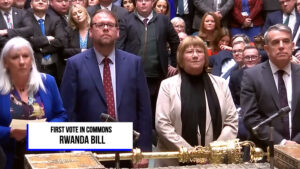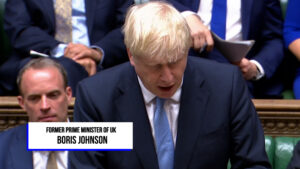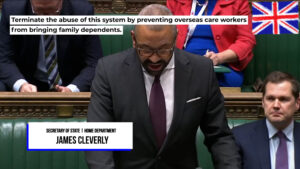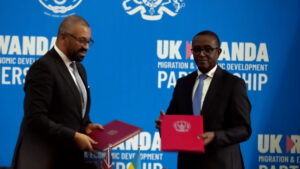By Rodaportal
INTRODUCTION
Navigating the intricacies of recent shifts in UK immigration policies is no easy feat, demanding a profound understanding of the challenges at play. Join us in an in-depth video as we dissect the multifaceted issues surrounding migration and the contentious policy decisions crafted to tackle them.
It’s imperative to grasp the significant problems posed by migrants in the nation. The rise in undocumented individuals poses challenges to national security, strains public resources, and sparks debates on economic impacts and societal integration. Delving into the complexities of UK immigration policies is key to addressing these challenges and establishing a fair and just immigration system.
Migrants play a vital role in the UK’s rich history and diverse culture, contributing positively to society. Understanding and respecting the country’s official religion, Christianity is crucial for fostering mutual respect and harmonious coexistence. Disregarding the cultural fabric or religious beliefs of the UK is unacceptable. Migrants are expected to integrate, embrace, and uphold the values that have shaped the nation over centuries, with consequences for those who fail to do so.

Shifting our focus to recent events in the UK Parliament, a pivotal vote was cast on the Rwanda Plan—a policy aimed at unravelling the complexities of illegal migration. The approval of this plan has ignited heated debates.
In addition, we’ll dissect the aftermath of the Rwanda Plan vote, exploring its alignment with broader immigration strategies. Join us as we unravel the layers of illegal migration, scrutinize recent policy decisions, and discuss the future trajectory of the United Kingdom.
Now, let’s delve into the heart of the matter and navigate the controversies surrounding recent shifts in UK immigration policies.

Why has UK Immigration Increased Since Brexit?
The surge in UK immigration post-Brexit has far-reaching implications beyond mere numbers. Driven mainly by non-EU workers and unexpected liberalization, this influx prompts closer scrutiny of its impact on citizens and culture.
While work visas address immediate labour shortages, questions arise about long-term consequences for the domestic workforce. Boris Johnson’s points-based system, intended to control immigration, unintentionally opens doors wider. This surge, combined with the challenge of illegal migration, creates a dynamic landscape where the government must balance social cohesion with humanitarian considerations.

Striking a balance between welcoming skilled workers and safeguarding national interests becomes paramount. The surge strains resources exacerbates housing shortages, and challenges public services. Navigating these complexities emphasises the need for a nuanced approach that addresses both labour needs and societal cohesion.
The Economic Impact of Immigration: Beyond the Numbers
Statistics indicate a significant influx, with over 1.2 million immigrants in 2022, raising concerns about their net contribution to the economy. Controversy arises over the exploitation of the dependence system, notably among migrants from India, Nigeria, and Pakistan.
The strain on public services intensifies as migrants utilize healthcare and education, adding pressure to an already stretched system. The debate questions whether immigrants, especially those with lower skills, are net contributors or a burden on the economy. Concerns about training and qualifications in professions like healthcare underscore the complexity of relying on a global workforce without consistent standards.

As economic ramifications take centre stage, a nuanced examination of legal and illegal policies is imperative. Critics’ concerns emphasize not just the numbers but also the quality and impact of immigration on the economic landscape.
Unhealthy Country Social Cohesion
The UK grapples with a rise in population, prompting concerns about the sustainability of such inflows. Experts stress the need for a robust integration policy to navigate challenges posed by continuous migration. Integrating large numbers without a comprehensive strategy risks societal challenges.
The absence of a detailed breakdown in migration figures obscures understanding, raising national security concerns. The lack of an effective integration policy raises red flags, questioning the country’s preparedness to assimilate diverse populations seamlessly.

The driving forces behind this migration phenomenon are multifaceted, involving economic considerations and addressing a declining workforce. Concerns about potential exploitation by corporations seeking cheap labour further complicate the migration landscape.
Immigration Plan: James Cleverly’s Five-Point Measures
In a significant address to the House of Lords, James Cleverly unveils a comprehensive immigration plan reshaping migration dynamics. The five-point strategy addresses critical issues, ensuring a balanced and sustainable approach to immigration.
The Health and Care Visa’s first measure aims to prevent abuse, aligning with organizations positively contributing to the economy. The second proposes a 66% increase in the annual Immigration Health Service charge to ensure financial contributions. The third prevents immigration from undercutting British workers’ salaries, exempting health and social care visa routes. The fourth tackles labour shortage by ending salary discounts for shortage occupations and reforming the list. The final measure refines the Graduate route to prevent abuse and protect the UK’s higher education sector.

Rwanda’s Bill: Analysis and Political Impact
The controversial Rwanda bill’s passage sparks heated debates in the UK Parliament, challenging recent Supreme Court assertions. Designating Rwanda as a safe country raises concerns about overriding international law and human rights principles. The “notwithstanding Clauses” instruct courts to disregard the Human Rights Act, adding controversy. While aiming to streamline deportation, a potential loophole raises concerns.
The recent victory in securing the bill’s passage highlights internal tensions among Conservative MPs. The bill’s future journey promises challenges, potentially influencing public opinion and impacting the Conservative Party’s stance on migration.

Conclusion: Navigating the UK’s Immigration Landscape
UK immigration policies stand at a critical juncture, demanding a balanced approach post-Brexit. James Cleverly’s plan and the Rwanda bill signify decisive moves, yet internal tensions linger. Stay informed, stay engaged, and be part of the ongoing conversation.

📺 Watch our in-depth analysis of the evolution of UK migration policies: [https://youtu.be/FrwlgFOGbRY]
